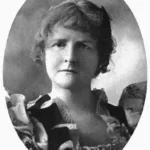 | |
A New England Prophet | |
| Author | Mary E. Wilkins Freeman |
|---|---|
| Published |
1894
|
| Language | English |
| Nationality | American |
| Genre | Gothic Fiction, Regionalism |
1894 Short Story
A New England Prophet
A New England Prophet is an English Gothic Fiction, Regionalism short story by American writer Mary E. Wilkins Freeman. It was first published in 1894. A New England Prophet first appeared in Harper's New Monthly Magazine (September, 1894).
A New England Prophet
by Mary E. Wilkins Freeman
At half-past six o’clock a little company of people passed down the village street in the direction of the Lennox farm-house.
They passed in silence, stepping along the frozen ridges of the road. It was cold, but there was no snow. There was a young moon shining through thin white clouds like nebulæ.
Now and then, as the company went on, new recruits were gathered from the scattered houses. A man would emerge darkly from a creaking gate, with maybe a second and third dark figure following, with a flirt of feminine draperies. There’s Deacon Scranton, or There’s Thomas Jennings and his wife and Ellen, the people would murmur to one another.
Once a gleam of candlelight from an open door lay across the road in advance, and wavered into darkness with a slam of the door when the company drew near. Then a solitary woman came ponderously down the front walk, seeming to jar the frozen earth with the jolt of her great feminine bulk. There’s Abby Mosely, somebody muttered. Sometimes two young girls fluttered out of a door-yard, clinging together with nervous giggles and outcries, which were soon hushed. They moved along with the others, their little cold fingers clinging together with a rigid clutch. It was as if a strange, solemn atmosphere surrounded this group moving along the country road in the starlit night. Whoever came into their midst felt it, and his emotions changed involuntarily as respiration changes on a mountaintop.
When the party reached a windy hilltop in sight of the lighted windows of the Lennox house in the valley below, it numbered nearly twenty. Halfway down the hill somebody else joined them. He had been standing ahead of them, waiting in the long shadow of a poplar, and they had not discerned him until they were close to him. Then he stepped forward and the shadow of the tree was left motionless. The young girls half screamed, he appeared so suddenly, and their nerves were strained. The elders made a solemn hushed murmur of greeting. They knew as soon as he moved that he was Isaac Penfield. He had a martial carriage of his shoulders, he was a captain in the militia, and he wore an ash-colored cloak which distinguished him.
The young girls cast glances, bolder from the darkness, toward his stately ash-colored shoulders and the pale gleam of his face. Not one of them who had not her own lover but had her innocent secret dreams about this Isaac Penfield. Now, had a light shone out suddenly in the darkness, their dreams would have shown in their faces.
One slender girl slunk softly around in the rear darkness and crept so close to Isaac Penfield that his ash-colored cloak, swinging out in the wind, brushed her cheek. He did not notice her; indeed, after his first murmur of salutation, he did not speak to anyone.
They all went in silence down the hill and flocked into the yard of the Lennox house. There was a red flicker of light in the kitchen windows from the great hearth fire, but a circle of dark heads and shoulders hid the fire itself from the newcomers. There were evidently a number of people inside.
Deacon Scranton raised the knocker, and the door was opened immediately. Melissa Lennox stood there holding a candle in a brass candlestick, with the soft light streaming up on her fair face. She looked through it with innocent, anxious blue eyes at the company. Won’t you walk in? she said, tremulously, and the people passed into the south entry, and through the door on the left into the great Lennox kitchen. Some dozen persons who had come from the other end of the village were already there.
Isaac Penfield entered last. Melissa did not see him until he stepped suddenly within her radius of candlelight. Then she started, and bent her head before him, blushing. The candle shook in her outstretched hand.
Isaac Penfield took the candle without a word and set it on the stairs. Then he took Melissa’s slim right hand in his and stood a moment looking down at her bent head with its parted gloss of hair. His forehead was frowning, and yet he half smiled with tender triumph.
Come out in the front yard with me a moment, he whispered. He pulled her with gentle force toward the door, and the girl yielded, after a faint murmur of expostulation.
Out in the front yard Isaac Penfield folded a corner of his ash-colored cloak around Melissa’s slender shoulders.
Now I want you to tell me, Melissa, he whispered. You are not still carried away by all this? He jerked his head toward the kitchen windows.
Melissa trembled against the young man’s side under the folds of his cloak.
You are not, after all I said to you, Melissa?
She nodded against his breast, with a faint sob.
I hoped you would do as I asked you, and cut loose from this folly, Isaac Penfield said, sternly.
Father says it’s true. Oh, I am afraid I am afraid! My sins are so great, and I cannot hide from the eyes of the Lord. I am afraid!
Isaac Penfield tightened his clasp of the girl’s trembling figure, and bent his head low down over hers. Melissa dear, can’t you listen to me? he whispered.
Suddenly the kitchen door opened and a new light streamed across the entry.
Melissa, where be you? called a woman’s voice, high pitched and melancholy.
There’s mother calling, Melissa said in a frightened whisper, and she broke away and ran into the house.
Her mother stood in the kitchen door. Where have you been? she began. Then she stopped, and looked at Isaac Penfield with a half-shrinking, half-antagonistic air. This stalwart young man, radiant with the knowledge of his own strength, represented to this delicate woman, who was held to the earth more by the tension of nerves than the weight of matter, the very pride of life, the material power which she was to fear and fight for herself and for her daughter.
I thought I would step into your meeting tonight, if I were permitted, Isaac Penfield said.
Mrs. Lennox looked at him with deep-blue eyes under high, thin temples. All are permitted who listen to the truth with the right spirit, said she, and turned shortly and glided into the kitchen. Melissa and Isaac followed.
The company sat in wide semicircles, three deep, before the fire. In the open space between the first semicircle and the fire, his wide armchair on the bricks of the broad hearth, half facing the company, sat Solomon Lennox. Near him sat his deaf-and-dumb son Alonzo. He held up a large slate so the firelight fell upon it, and marked upon it with a grating pencil. He screwed his face with every stroke, so it seemed that one watching attentively might discern the picture itself from his changing features.
Alonzo Lennox was fourteen years old, but he looked no more than ten, and he had been deaf and dumb from his birth. The firelight gave a reddish tinge to his silvery blond hair, spreading out stiffly from the top of his head over his ears like the thatch of a hut. His delicate irregular profile bent over the slate; now and then a spasm of silent merriment shook his narrow chest, and the surrounding people looked at him with awe. They regarded it as the mystic ecstasy of a seer.
Melissa and her mother had slid softly through the semicircles to the chairs they had left. Isaac Penfield stood on the outskirts, towering over all the people, refusing a seat which somebody offered him. He threw off his ash-colored cloak and held it on his arm. His costume of fine broadcloth and flowered satin and glittering buttons surpassed any there, as did his face and his height and his carriage; and, more than all, he stood among the others raised upon a spiritual eminence, unseen, but none the less real, which his ancestors had reared for him before his birth. The Penfield name had been a great one in that vicinity for three generations. Once Penfields had owned the larger part of the township. Isaac’s father, and his grandfather before him, had been esquires, and held as nearly the position of lords of this little village as was possible in New England. Now this young man was the last of his race, living, with his housekeeper and an old servant, in the Penfield homestead; and the village adulation which had been accorded to his ancestors was his also in a large measure.
Tonight, as he entered, people glanced at him, away from Alonzo and his slate, but only for a moment. The matter under discussion that night was too solemn and terrible to be lost sight of long.
In about ten minutes after Isaac Penfield entered, the boy gave a shout, grating and hideous, with a discord of human thoughts and senses in it. A shudder passed over the company like a wind.
Alonzo Lennox sprang up and waved the slate, and his father reached out for it. Give it to me, he demanded, sternly, as if the boy could hear. But Alonzo gave another shout, and leaped aside, and waved the slate out of his father’s reach. Then he danced lightly up and down on the tips of his toes, shaking his head and flinging out fantastic heels. His shock of hair flew out wildly and looked like a luminous crown; the firelight struck his dilated eyes, and they gleamed red.
The people watched him with sobbing breaths and pale faces, all except Isaac Penfield and one other. Isaac stood looking at him, with his mouth curling in a scornful smile. Solomon Lennox stood aside with a startled air; then he caught the boy firmly by the arm and grasped the slate.
Alonzo grinned impishly in his father’s face; then he let go the slate and sank down on his stool in the chimney corner. There he sat submissive and inactive, except for the cunning, sharp flash of his blue eyes under his thatch of hair.
Solomon Lennox held the slate to the light and looked at it, while the people waited breathless, their pale intent faces bent forward. Then he handed the slate, without a word, to the man at the end of the first semicircle, and it was circulated through the entire company. As one passed the slate to another a shuddering thrill like an electric shock seemed to be passed with it, and there was a faint murmur of horror.
Isaac Penfield held the slate longest, and examined it closely. Drawn with a free hand, which certainly gave evidence of some inborn artistic skill aside from aught else, were great sweeping curves of wings upbearing an angel with a trumpet at his mouth. Under his feet were lashing tongues as of flames, with upturned faces of agony in the midst of them. And everywhere, between the wings and the angel and the flames and the faces, were, in groups of five, those grotesque little symbols of the sun, a disk with human features therein, which one sees in the almanacs.
After Isaac Penfield had finished looking at the mystic slate he passed it to Solomon Lennox’s elder brother, Simeon, who sat at his right. The old man’s hard shaven jaws widened in a sardonic grin; his small black eyes twinkled derisively over the drawings. Pretty pictures, he said, half aloud. Then he passed the slate along with a contemptuous chuckle which was heard in the solemn stillness all over the room.
Solomon Lennox gave a furious glance in his brother’s direction. This is no time nor season for scoffer! cried he. And his voice seemed to shock the air like a musket shot.
Simeon Lennox chuckled again. Solomon’s right hand clinched. He arose; then sat down again, with his mouth compressed. He sat still until the slate had gone its rounds and returned to the boy, who sat contemplating it with uncouth delight; then he stood up, and the words flowed from his mouth in torrents. Never at a loss for subject matter of speech was Solomon Lennox. By the fluency of his discourse he might well have been thought inspired. He spoke of visions of wings and holy candlesticks and beasts and cups of abomination as if he had with his own eyes seen them like the prophet of old. He expounded strange and subtle calculations and erratic interpretations of history as applied to revelation with a fervor which brought conviction to his audience. He caught the slate from his deaf-and-dumb son, and explained the weird characters thereon. The five suns were five days. Five times the sun should arise in the east, as it had done from the creation; then should the angel, upborne on those great white wings, sound his trumpet, and the flames burst forth from the lower pit, and those upturned faces in the midst of them gnash with despair.
Repent, for the day of the Lord is at hand! shouted Solomon Lennox at the close of his arguments, and his voice itself rang like a trumpet full of all intonations and reverberations, of awe and dread. Repent, for the great and dreadful day of the Lord is at hand! Repent while there is yet time, while there is yet a foothold on the shore of the lake of fire! Repent! Repent! Prepare your ascension robes! Renounce the world and all the lust and the vanity thereof! Repent, for the Day of Judgment is here! Soon shall ye choke with the smoke of the everlasting burning, soon shall your eyes be scorched with the fiery scroll of the heavens, your ears be deafened with the blast of the trumpet of wrath, and the cry against you of your own sins! Repent! Repent! Repent!
Solomon Lennox’s slight figure writhed with his own emotion as with internal fire; the veins swelled out on his high bald forehead; his eyes blazed with fanatical light. Aside from the startling nature of his discourse, he himself was a marvel and a terror to his neighbors. His complete deviation from a former line of life produced among them the horror of the supernatural. He affected them like his own ghost. He had always been a man of few and quiet words, who had never expressed his own emotions in public beyond an inaudible, muttered prayer at conference meeting, and now this flood of fiery eloquence from him seemed like a very convulsion of human nature.
When a great physical malady is epidemic there are often isolated cases in remote localities whose connection with the main disturbance cannot be established. So in this little New England village, far from a railroad, scarcely reached by the news of the day, Solomon Lennox had developed within himself, with seeming spontaneity, some of the startling tenets of Joseph Miller, and had established his own small circle of devoted disciples and followers. It was as if some germs of a great spiritual disturbance had sought, through some unknown medium, this man’s mind as their best ripening place.
After Solomon had arisen one night in conference meeting and poured forth his soul to his startled neighbors in a strain of fiery prophecy, Millerite publications had been sent for, and he had strengthened his own theories with those of the original leader, although in many respects his maintained a distinct variance.
The effect of Solomon’s prophecies had been greatly enhanced by the drawings of his deaf-and-dumb son. Alonzo Lennox’s slate, covered with rude representations of beasts and trumpets and winged creatures the weird symbolic figures of the prophet Daniel had aroused a tumult of awe and terror in the village. And the more so because the boy had never learned the language of the deaf and dumb, and had no ordinary and comprehensible means of acquiring information upon such topics.
Tonight, as his father spoke, he kept his blue eyes upon his face with such a keen look that it seemed almost impossible that he did not hear and comprehend every word. Unbelievers in this new movement were divided between the opinion that Lonny Lennox had heard more than folks had given him credit for right along, and the one that he understood by some strange power which the loss of his other faculties had sharpened.
The boy has developed the sixth sense, Isaac Penfield thought as he watched his intent face upturned toward his father’s; and he also thought impatiently that he should be cuffed and sent to bed for his uncanny sharpness. He grew more and more indignant as the time went on and the excitement deepened. He watched Melissa grow paler and paler and finally press her slender hands over her face and shake with sobs, and made a sudden motion as if he would go to her. Then he restrained himself and muttered something between his teeth.
Old Simeon Lennox watched him curiously; then he hit him in the side with a sharp elbow. Made up your mind to go up in our family chariot on the last day? he whispered, with a hoarse whistle of breath in Isaac’s ear. Then he leaned back, with a long cackle of laughter in his throat, which was unheard in the din of his brother’s raging voice and the responsive groans and sobs.
Isaac Penfield colored, and kept his eyes straight forward and his head up with a haughty air. Presently the old man nudged him again, with the sharpness of malice protected by helplessness. Guess, he whispered, craning up to the young man’s handsome, impatient face guess you ain’t much opinion of all this darned tomfoolery, neither.
Isaac shook his head fiercely.
Well, said the old man, let ’em go it, and he cackled with laughter again.
After Solomon Lennox had finished his fervid appeal, two or three offered prayers, and many testified and confessed sins and professed repentance and terror of the wrath to come, in hoarse, strained voices, half drowned by sobs and cries.
It was nearly midnight before Solomon Lennox declared the meeting at a close, and recommended the brethren and sisters to repair to their homes, not to sleep, but to pray, and appointed another session for the next forenoon, for these meetings of terror-stricken and contrite souls were held three times a day morning, afternoon, and evening. In those days the housewives’ kitchen tables were piled high with unwashed dishes; the hearths were unswept and the fires low; the pantry shelves were bare, and often the children went to bed with only the terrors of the judgment for sustenance.
In those days the cattle grew lean and stood lowing piteously long after nightfall at the pasture bars. Even the horses turned in their stalls at every footfall and whinnied for food. Men lost all thought for their earthly goods in their fierce concern for their own souls.
The people flocked out of Solomon Lennox’s kitchen, some with rapt eyes, some white-faced and trembling, huddling together as if with a forlorn hope that human companionship might avail somewhat even against divine judgment. The deaf-and-dumb boy went sleepily out of the room and upstairs with his candle, leaving his slate on the hearthstone. Isaac Penfield stood a few minutes looking irresolutely at Melissa, who sat still with her hands pressed tightly over her face, as if she were weeping. Her mother stood near her, talking to Abby Mosely, who was Simeon Lennox’s housekeeper. The woman was fairly gasping with emotion; her broad shawled bosom heaved.
Repent! cried Mrs. Lennox, loud, in her ears, like an echo of her husband. Repent! There is yet time! There are five days before the heavens open! Repent! Her nervous hands served to intensify her weak, straining voice. They pointed and threatened in the woman’s piteous, scared face. Isaac started to approach Melissa; then her mother half turned and seemed to shriek out her warning cry toward him, and he tossed his gray cloak over his shoulders, strode out of the room and out of the house.
Old Simeon Lennox lingered behind the others.
I’m a-comin’ right along, Abby, he called to his housekeeper when she started to leave the room. If ye go to bed afore I come, mind ye put the cat out, so she won’t get afoul of that pig meat in the pantry. Simeon spoke with cool disregard of the distressed sobs and moans with which the woman was making her exit.
D’ye hear what I say, Abby? he called, sharply, when she did not reply.
The housekeeper groaned a faint assent over her shoulder as she crossed the threshold.
Well, mind ye don’t forgit it, said Simeon, for I tell ye what ’tis, if that cat does git afoul of that pig meat, there’ll be a jedgment afore Thursday.
The old man clamped leisurely across the room, drew an armchair close to the fire, and settled into it with a grunting yawn.
Fire feels good, he remarked. His voice was thick, for he had tobacco in his mouth.
Woe be unto you, Simeon Lennox, if you can still think of the comfort of your poor body which will soon be ashes, cried his sister-in-law. She waved before him like a pale flame; her white face seemed fairly luminous.
Simeon shifted his tobacco into one cheek as he stared at her. You’d better go to bed, Sophy Anne; you’re gittin’ highstericky, said he, and chewed again.
Woe be unto you, for the bed you shall lie on, unless you repent, Simeon Lennox!
Look at here, Sophy Anne, said Simeon. Ain’t you got no mince pies in the house?
Mrs. Lennox looked at him, speechless, for a moment.
If you have, Simeon went on, I wish you’d give me a piece. I ain’t had no mince pie fit to eat I dun’no’ when. Abby Mosely wa’n’t never much of a cook, and sence she’s took to goin’ to your meetin’ here three times a day, it’s much as ever’s I get anything. It ain’t no more’n fair, Sophy Anne, that you should give me a piece of mince pie, if you’ve got any.
Mrs. Lennox broke in upon him with a cry which was almost a shriek: I shall make no more pies in this world, Simeon Lennox. Woe be unto you! Woe be unto you if you think of such things in the face of death and eternal condemnation!
Solomon Lennox had followed the departing people into the yard. His exhorting voice could still be heard out there, for the doors were open.
Simeon looked around and shivered. If you ‘ain’t got no mince pie, I wish you’d shet that door, Sophy Anne, he said.
Sophia Anne Lennox stood looking at him for a minute. He chuckled in her face. She snatched a candle from the shelf and went out of the room with an air of desperation.
Melissa rose up and crept after her, her face like a drooping white flower, gliding so closely in her mother’s wake that she seemed to have no individual motion of her own. Simeon looked hard at her as she went.
Sophy Anne is wiry, he said, when his brother came in. She’ll go it all right if the wires don’t snap, an’ I reckon they won’t; but you’d better look out for Melissy. She can’t stan’ such tearin’ work as this very long. She’ll have a fever or somethin’.
What matters that? cried Solomon. What matters any tribulation of the flesh when the end of all flesh is at hand? His voice was hoarse with his long clamor. He leaned over and shook a nervous fist impressively before his brother’s face.
Simeon chewed on, and looked at the fist without winking. You don’t mean to say, Solomon Lennox, said he at length that you believe all this darned tomfoolery?
His brother looked at him with solemn wrath.
Do I believe revelation and the prophets? he cried. Woe be unto all scoffers, even though they be my own flesh and blood!
Now, Solomon, I’ll jest stump ye to point out any passage in the Scripturs that says, up an’ down, square an’ fair, that the world’s comin’ to an end next Thursday. I’ll jest stump ye to do it.
There are passages that point to the truth, and I have repeated them tonight, replied Solomon, hotly.
Passages that ye’ve had to twist hind side foremost, an’ bottom side up, an’ add, an’ subtract, an’ divide, an’ multiply, an’ hammer, an’ saw, an’ bile down, an’ take to a grist mill, afore you got at the meanin’ you wanted, returned his brother, contemptuously. That ain’t the kind of passage I’m after. There’s too much two-facedness an’ double-dealin’ about the Scripturs anyway, judgin’ by some of you folks. What I want is a square up-an’-down passage that says, without no chance of its meanin’ anything else, The world is comin’ to an end next week Thursday. I stump ye to show me sech a passage as that. Ye can’t do it!
The habits of a lifetime are strong even in strained and exalted states, acting like the lash of a familiar whip. Solomon Lennox was the younger brother; all his life he had borne a certain docility of attitude toward Simeon, which asserted itself now.
The fervid orator stood for a moment silent before this sceptical, sneering elder brother. I’d like to know how you account for Lonny’s drawin’s, he said at length, in a tone which he might have used when bullied by Simeon in their boyhood.
Drawin’s, drawled Simeon, and sarcasm itself seemed to hiss in the final s dr-r-awin’s! The little scamp is sharp as steel, an’ he’s watched an’ he’s eyed till he’s put two an’ two together. It’s easy enough to account for the drawin’s. The air here has been so thick lately with wings an’ wheels an’ horns an’ trumpets an’ everlastin’ fire that anybody that wa’n’t an idgit could breathe it in. An’ I miss my guess if his mother ‘ain’t showed him the picturs in the big Bible more’n once when you’ve been talkin’, an’ pointed out the hearth fire an’ the candlesticks an’ the powderhorn. Sophy Anne’s sharp, an’ she’s done more to learn that boy than anybody knows of, though I’ve got my doubts now as to how straight he’s really got it in his mind. Lord! them drawin’s ain’t nothin’. Solomon Lennox, you can’t look me in the face an’ say that you actilly believe all this darned tomfoolery!
Solomon for these few minutes had been on the old level of a brotherly argument, but now he arose suddenly to his latter heights.
I believe that the end of the world is near, that the great and dreadful day of the Lord is at hand, accordin’ to prophecy and revelation, he proclaimed, and his eyes shone under his high forehead as under a majestic dome of thought and inspiration.
Simeon whistled. Ye don’t, though. Look at here, Solomon; tell ye what I’ll do. I’ll put ye to the test. Look at here, you say the world’s comin’ to an end next Thursday. Well, it stands to reason if it is, that you ain’t got no more need of temporal goods. S’pose you give me a deed of this ‘ere farm?
Solomon stared at his brother.
Simeon shook his fist at him slowly. Ye won’t do it, he said, with a triumphant chuckle.
I will do it.
Git Lawyer Bascombe to draw up the papers tomorrow?
I will.
Me to take possession by daylight next Friday mornin’, if the world don’t come to an end Thursday night?
Yes, replied Solomon, hurling the word at his brother like a stone.
Simeon got up and buttoned his coat over his lean chest. Well, said he, I’ve had pretty hard luck. I’ve lost three wives, and I’ve been burnt out twice, an’ the last house ain’t none too tight. I’ll move right in here next Friday mornin’ at daylight. Mebbe I’ll get married again.
Much good will the heaping up of barns an’ storehouses do when you hear the voice of the Lord saying, Thou fool, this night shall thy soul be required of thee, returned his brother; but he spoke the fervid words with a certain feebleness. All his life since he was a boy had Solomon Lennox toiled and saved to own this noble farm. The bare imagination of giving it up to another cost him much, although he firmly believed that in a week’s space it would be only a modicum of the blackened ashes of a world. He stood the test of his faith, but he felt the scorch of sacrificial flame.
It ain’t me that’s the fool, said Simeon, shrugging himself into his greatcoat. I ain’t goin’ to hang back with my soul when it’s required of me, but I ain’t goin’ to keep chuckin’ of it in the face of the Lord afore He’s ready for it, like some folks I know. Them’s the fools. When’ll you be down to Lawyer Bascombe’s tomorrow, Solomon, to deed away these barns an’ storehouses that you ‘ain’t no more use for?
I’ll be down there at nine o’clock tomorrow mornin’.
All right; you can count on me, said Simeon. He went out, and Solomon bolted the door after him promptly. But he had no sooner returned to the kitchen than there came a sharp tap on the window, and there was Simeon’s hard leering old face pressed against the pane. You’ll have to fetch Sophy Anne down there tomorrow, he called. She’ll have to sign that deed, too, or it won’t stan’.
All right, shouted Solomon, and the face at the window, with a parting nod, disappeared.
Lawyer Bascombe’s office was in the center of the village, over the store. A steep flight of stairs at the right of the store led to it. Up these stairs, at nine o’clock the next morning, climbed Solomon Lennox and his wife Sophia Anne, with pale devoted faces, and signed away all their earthly goods as an evidence of their faith.
In some way the matter had become known in the village. When Solomon and Sophia Anne came down the stairs there was quite a crowd before the door, standing back with awed curiosity to let them pass. Simeon Lennox did not leave at once after the signing of the deed. When he appeared in the doorway with a roll of paper in his hand the crowd had dispersed.
Without any doubt this act of Solomon Lennox and his wife materially strengthened their cause. When it became known that they had actually signed away their property in their confidence that days of property holding were over, even scoffers began to look serious. That evening the meeting at Solomon Lennox’s house numbered a third more than usual. The next evening it was doubled, and the best room as well as the kitchen was filled. Solomon stood at the foot of the stairs in the entry between the rooms and exhorted, while the deaf-and-dumb boy’s slate circulated among the awe-stricken people.
Isaac Penfield came to no more meetings, and he did not see Melissa again until Tuesday. Late Tuesday afternoon she went up to the village store with a basket of eggs. The days of barter were nearly over, as she had been taught to believe, but there was no molasses in the house, and the poor deaf-and-dumb boy was weeping for it with uncouth grief and could not be comforted by the prospect of eternal joys. When Melissa came out of the store with the bottle of molasses in her basket, Isaac Penfield’s bay mare and chaise were drawn up before the platform, and Isaac stood waiting. Melissa started and colored when she saw him.
Get in, please, he said, motioning her toward the chaise.
She looked at him falteringly.
Get in, please, Melissa. I want to speak to you.
The bay mare was restive, tossing her head and pawing with one delicate forefoot. Isaac could scarcely keep her quiet until Melissa got in. When he took the reins she gave a leap forward, and the chaise swung about with a lurch. Isaac threw himself back and held the reins taut; the mare flew down the road, pulling hard on her bit; the chaise rocked high on the frozen road. Melissa sat still, her delicate face retired within the dark depths of her silk hood.
Isaac did not speak to her until they reached the foot of a long hill. I want to ask you something, he said then, with a wary eye still on the straining shoulders of the mare. I want to ask you again to give this up.
Melissa did not speak.
Won’t you promise me?
I can’t, she said, faintly.
You can if you will. Suddenly Isaac leaned over her. Won’t you promise me, Melissa?
She shrank away from him. I can’t. I believe father.
Melissa, you don’t.
I do, said she, with a despairing sob.
Isaac Penfield bent his face down close to hers. Can’t you believe me as well as your father? Melissa, look at me.
Melissa bent her head down over her hands.
Look at me, Melissa.
She raised her head slowly as if there were a constraining hand under her chin, and her eyes met his.
Can’t you, Melissa?
Fair locks of hair fell over the girl’s gentle cheeks; her soft mouth quivered. It seemed as if her piteous blue eyes were upheld only by the look in the young man’s, and as if all the individual thought and purpose in her face and her whole soul were being overcast by his imperious will, but she shook her head.
Can’t you, Melissa?
She shook her head again.
Isaac Penfield’s face turned white. He touched the whip to the mare and she gave a sharp bound forward. They had not much farther to go. Neither of them spoke again until Isaac as







